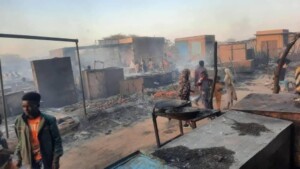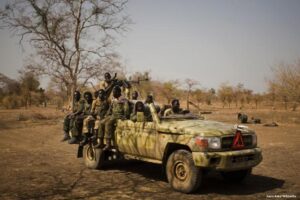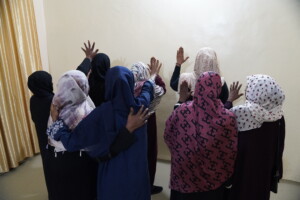Hausa protesters torch govt offices in eastern Sudan’s Kassala
Angry young Hausa tribesmen set fire to a number of government buildings in Kassala on Monday, in protest against what they called the laxity of the Sudanese authorities concerning recent tribal clashes in Blue Niles state which left dozens of people dead. Two Kassala protesters reportedly died, and ten others were injured.
 Hausa protesters in Kassala torch government offices in protest against delayed intervention in Blue Nile state tribal clashes, July 18 (Social media)
Hausa protesters in Kassala torch government offices in protest against delayed intervention in Blue Nile state tribal clashes, July 18 (Social media)
Angry young Hausa tribesmen set fire to a number of government buildings in Kassala on Monday, in protest against what they called the laxity of the Sudanese authorities concerning recent tribal clashes in Blue Niles state which left dozens of people dead. Two Kassala protesters reportedly died, and ten others were injured. A demonstration in Rabak, White Nile state, was peaceful. Malik Agar, rebel leader and member of Sudan’s Sovereignty Council, said he will send government troops from Khartoum to Blue Nile state to contain the fighting.
According to reports from yesterday, at least 80 people died and more than 200 others were wounded during fierce fighting that broke out between opposing Hausa and Berta ethnic groups last week. Government forces have now been deployed in the area of Ed Damazin, capital of Blue Nile state, and neighbouring El Roseires, in an effort to quell the violence.
On Monday morning, angry Hausa protesters in Kassala crossed the bridge over the El Gash river, which connects the eastern and western parts of the city. They kept the bridge closed for some time, until a joint government force dispersed them, activist Hamrour Hussein told Radio Dabanga from the eastern Sudanese city.
He said that the protesters “in large numbers crossed the bridge from the western side, entered the city centre, and set fire to the offices of the Kassala locality Education Department and the Kassala Petroleum Department. Parts of the Government Secretariat, the Trade and Supply Administration, and the water station burned down as well.
“People quickly evacuated the city’s markets with the closure of shops and transport was halted.”
Hussein explained that the Hausa took to the streets “to express their discontent with the Sudanese authorities who allow violent clashes to happen by being lax and not interfering”.
According to the activist, the executive director of Kassala locality and the state security committee are to be held responsible for the damage. “The protesters could have been prevented from entering the city, before they stormed the bridge from the western side.”
He added that “the city of Kassala is witnessing a state of insecurity for some time already. People carry sticks and knives to defend themselves against the increasing petty crimes and in anticipation of attacks.”
Prof Salah Kassoulai, head of the Kassala Centre Movement, blamed the local authorities for the deployment of army forces against the protests “which should have been dealt by the police”.
He said that the clashes between the protesters and the army forces led to two deaths and ten injuries.
A demonstration by Hausa in Rabak in White Nile state yesterday, to protest “against the targeting of the tribe's members in the Blue Nile region”, remained peaceful. No violence was reported.
Responses
The Emirate of All Hausa Tribes denounced the violence in Kassala in a press statement on Monday, and affirmed the solidarity of the Hausa people with the official authorities in Sudan “in containing the chaos”.
On Monday as well, Malik Agar, member of the Sovereignty Council and head of the Sudan People’s Liberation Movement-North-Agar faction that has its base in Blue Nile state, has urged UN agencies to provide urgent humanitarian aid to the people affected by the ongoing conflicts in the Blue Nile region.
During his meeting with the Resident Coordinator for Humanitarian Affairs, the Deputy Special Representative, Resident, and Humanitarian Coordinator for Sudan Khardiata Lo N'Diaye yesterday, he said he would send reinforcements from the regular forces from Khartoum to Blue Nile state, “to act in a neutral manner, prevent ethnic and racial polarisation in the region, and end the conflicts”.
Kholood Khair, broadcaster and managing partner of Insight Strategy Partners, a think-and-do tank in Khartoum commented in a tweet yesterday that “This is a gold rush and a building of war chests by the emerging ethnic blocs of Burhan and the Centre vs Hemedti and the Periphery, giving a radically militarised trajectory to Sudan's political future.
“The RCs [Resistance Committees] recognise this, calling for unity during today's protests. The IC [International community) has been sleeping on this, with a compartmentalised approach to Khartoum politics vs the rest of Sudan, little recognising that supporting pro-dem forces and the new politics they espouse, is the ONLY way to stop the regime's militaristic transactional politics.”











 and then
and then